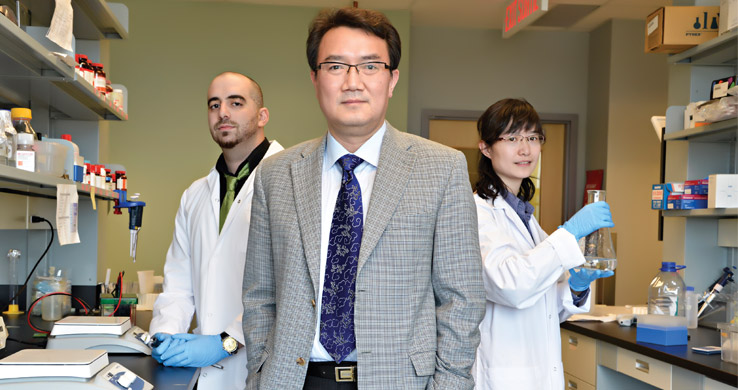OTTAWA (May 2, 2017) — The cannabinoids that our own brain cells make are fundamentally linked to consciousness according to new research from The Royal’s Institute of Mental Health Research (IMHR), affiliated with the University of Ottawa.
“Until now, despite decades of intensive research, we’ve known almost nothing about the brain circuitry that makes us conscious,” says Dr. Xia Zhang, lead researcher for the study published today in the prestigious Journal of Clinical Investigation. “This is a big discovery, with huge implications for future research.”
This project, led by Dr. Zhang’s research group at the IMHR in collaboration with seven other groups in Canada, China, and the United States, looked at the return of consciousness in mice after general anesthesia.
To be conscious is to be aware of one’s environment and self. Even when we’re asleep, we can respond to stimuli within and around us.
Mammal brain cells produce cannabinoids, called endocannabinoids, which we know play important roles in an array of brain functions. We now also know that consciousness is one of them. Endocannabanoids are neurotransmitters — chemical messengers within the nervous system.
The researchers showed that chemicals blocking endocannabinoids’ signals made mice become conscious rapidly after general anesthesia. They were also able to map the pathways in the brain responsible for this effect — pathways characterized by endocannabinoid signalling.
These findings open the doors to further research, including potential studies with humans alongside anesthesiologists. Being able to accelerate a return to consciousness using endocannabinoid blockers could also have immense potential for some coma patients.
Read now: http://www.jci.org/articles/view/91038
About The Royal
The Royal is one of Canada’s foremost mental health care, teaching and research hospitals. Its mandate is simple: to help more people living with mental illness into recovery faster. The Royal combines the delivery of specialized mental health care, advocacy, research and education to transform the lives of people with complex and treatment resistant mental illness. This includes our Operational Stress Injury (OSI) Clinic, which treats Canadian Forces, veterans and RCMP, and is the only such clinic within a specialized academic mental health centre. The Royal’s Institute of Mental Health Research, affiliated with the University of Ottawa, brings together leading clinicians, scientists and technology to investigate the brain circuitry linked to depression, posttraumatic stress disorder and suicide ideation. The Royal Ottawa Foundation for Mental Health raises funds that support The Royal’s work. The Royal places a sharp focus on awareness building through the You Know Who I Am campaign and public education initiatives such as Conversations at The Royal and Is It Just Me? Conversations about Youth Mental Health.
